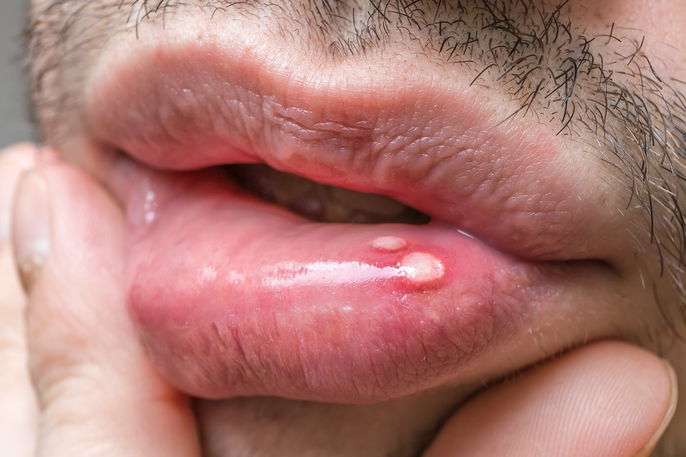What causes canker sores is not fully understood, but there are some factors that appear to be associated with their emergence, like a weakened immune system, eating acidic foods, or having braces.
A canker sore is small lesion that can grow on the tongue, mouth or outer or inner mouth. Certain medications, stressful situations, and gastric disorders can also trigger canker sores. It can make talking, eating, and swallowing uncomfortable.
Canker sores that are very large or painful enough to interfere with talking or eating should be assessed by a doctor or dentist. Treatment may include lidocaine ointments to relieve discomfort, although treatment should be aimed at treating the underlying cause that triggered them.

What causes cancer sores?
The most common causes of canker sores include:
1. Using braces
It is common for mouth sores to appear when braces are put on. This is because friction from the hardware on the oral mucose can cause small cuts and lesions, leading to the growth of a canker sore. Even though it causes great discomfort, you should continue to maintain dental hygiene.
How to treat: If you experience canker sores as a result of braces, you should visit a dentist for assessment. The doctor may recommend that you use protective wax on the braces and that you clean the lesion well to avoid infections.
2. Nutritional deficiencies
Zinc, iron, folate, and vitamin B12 deficiencies can promote the appearance of canker sores.
How to treat: Ensure you are achieving the recommended daily intake for zinc, iron, folate, and vitamin B12. You are advised to see a registered dietitian for further guidance. Learn more about vitamin B12 deficiency and what can cause it.
3. Genetics
When several people within the same family often experience canker sores, genetic predisposition may play a role in their appearance.
How to treat: There is no way to control genetic factors, but there are ways of decreasing your risk for these mouth sores. Consider avoiding eating citrus fruits like pineapples often, as well as spicy foods, as these can irritate the oral mucosa and cause canker sores to appear.
4. Biting your tongue or cheek
Biting your tongue or cheek promotes the appearance of canker sores, which can make simple things like talking, swallowing, and chewing difficult and painful.
How to treat: To care for the canker sores, you can apply medicated creams on the affected area such as triamcinolone dental pastes. Rinsing your mouth with Stryphnodendron tea is also helpful for healing, as this plant contains has antiseptic properties.
5. Psychological factors
Stress and anxiety can decrease the effectiveness of your immune system’s and increase your chances of infection. Decreased mood can also dry out the oral mucosa, which encourages canker sores to appear.
How to treat: Managing stress and anxiety are important for controlling canker sores. Resting when necessary and performing physical activity may be helpful. See how you can naturally manage stress and anxiety with herbs.
6. Celiac disease
Celiac disease is a gastrointestinal disease characterized by an intolerance to gluten. Celiac disease does not cause canker sores, but the appearance of sores can be a symptom of the disease and, therefore, celiac disease should be investigated.
How to treat: If celiac disease is confirmed, you should see a registered dietitian to initiate and establish a gluten-free diet.
7. AIDS
In addition to celiac disease, the appearance of mouth sores can be a symptom of AIDS. However, canker sores in the presence of AIDS are often large, very frequent, take longer to heal due to the compromised immune system.
How to treat: If you suspect you have been exposed to HIV or that you have AIDS, you should see your doctor immediately to initiate prompt treatment. Check-out the most common symptoms of AIDS.
When to see the doctor
You should see your doctor for assessment when:
- The canker sores are large;
- The appearance of mouth sores is very frequent;
- The canker sores take a while to disappear;
- Lesions start appearing on the lips;
- The pain when swallowing or chewing does not pass even after taking analgesics.
If you experience any of these symptoms, you should see your doctor for assessment, as there may be an underlying cause that can be treated or managed, like Crohn’s disease, irritable bowel syndrome, and even AIDS.
Home remedies to get rid of canker sores
Canker sores usually disappear on their own within a week or two. However, home remedies can speed up healing. Some examples are:
- Rinsing the mouth with warm water and salt, 3 times per day. Salt contains antiseptic properties, which keeps the area clean and speeds up healing. To make this remedy at home, simply add a teaspoon of salt to a glass of warm water and stir well;
- Place an ice cube directly on the canker sore to help relieve any pain an inflammation;
- Honey contains healing properties, and can be applied on the canker sore using a cotton ball or cotton swab.
Additionally, it is important to avoid eating spicy or acidic food, like lemon, kiwi or tomato, while the canker sore is present. To avoid infection in the area, you should rinse your mouth with an antiseptic mouthwash every day and maintain good daily hygiene.
You can also check out these home remedies for mouth ulcers, which are applicable to healing canker sores.






























